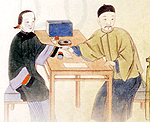Diagnosis in TCM places importance on determining the circumstances and manifestations of a disease through inquiry and symptom observation. Diagnosis is based on the traditional four examination techniques:
| 1. |
Questioning The TCM practitioner will establish the medical history of both the patient and his family. |
| 2. |
Observation Examination of the physical features of the body, such as the face, tongue, hair, nails, sputum (mucus that is coughed up), and location of pain, all offer clues to the problem. The tongue is a particularly useful indicator of the functioning of the internal organs. |
| 3. |
Listening and smelling The smelling of sputum and breath and listening to the sounds produced by the chest offer additional clues to the patient's health. |
| 4. |
Touching Feeling the pulse is a cornerstone of TCM diagnosis and gives the practitioner much information about any bodily imbalance. |
 |
| A Chinese doctor feeling a patient's pulse |
In Ménière's disease, the procedures used in TCM to differentiate between disharmony patterns can be explained as follows:
Deficit in the sea of marrow
This syndrome group is the result of kidney deficiency. When kidney essence becomes depleted, production of brain marrow declines. The brain loses nourishment and the result is dizziness. Furthermore, the ear is the surface opening of the kidney and as the kidneys also produce marrow for bones, ringing in the ears and soreness of the back and knees develop concomitantly.
On examination, the tongue is red with scanty fur. The pulse is thready, fine and rapid.
Deficiency in qi and blood
As defective qi circulation causes a disturbance to the function of the brain and insufficiency of blood leads to a lack of nourishment, the result to the brain is dizziness. Exertion consumes more qi and so triggers an attack. Other presentations of qi deficiency include fatigue, a reluctance to speak, sleepiness and lack of appetite.
On examination, the tongue is pale. The pulse is fine and rapid.
Flood of cold-dampness
The syndrome results from the retention of coldness and dampness evils, and damage to the kidneys. The evils not only obstruct the orifices in the head, leading to dizziness, they also bring manifestations of patterns of cold, such as a low body temperature, fatigue and lack of affect (emotion). Kidney damage is usually involved in this condition, so the individual may experience pain and a cold sensation in loin area, or frequent urination at night.
On examination, the tongue is pale, and coated with white and moist fur. The pulse is deep, weak and fine.
Disturbance of liver-yang
This pattern is usually triggered by an emotional disturbance, which gives rise to hyperactivity of liver-yang and generates wind evil. The symptoms that result include dizziness, headache, insomnia and nightmares. Moreover, due to yang excess, individuals can also experience heat symptoms, such as a flushed face, blood-shot eyes, a bitter taste in the mouth and a dry throat.
On examination, the tongue is red and coated with yellow fur. The pulse is taut and rapid.
Obstruction by viscous phlegm
When phlegm remains in the head and causes obstruction of orifices, normal qi flow will be affected. The individual experiences dizziness, fatigue, and heaviness and throbbing in the forehead. When phlegm stays inside the organs, symptoms such as chest discomfort, nausea, vomiting and poor appetite develop.
On examination, the tongue is pink, and coated by white and greasy fur. The pulse is uneven and slippery, or may be taut.
Note: If a TCM practitioner suspects a serious problem that Chinese medicine alone cannot treat, he or she will recommend the individual to see a Western doctor for further follow-up.
|